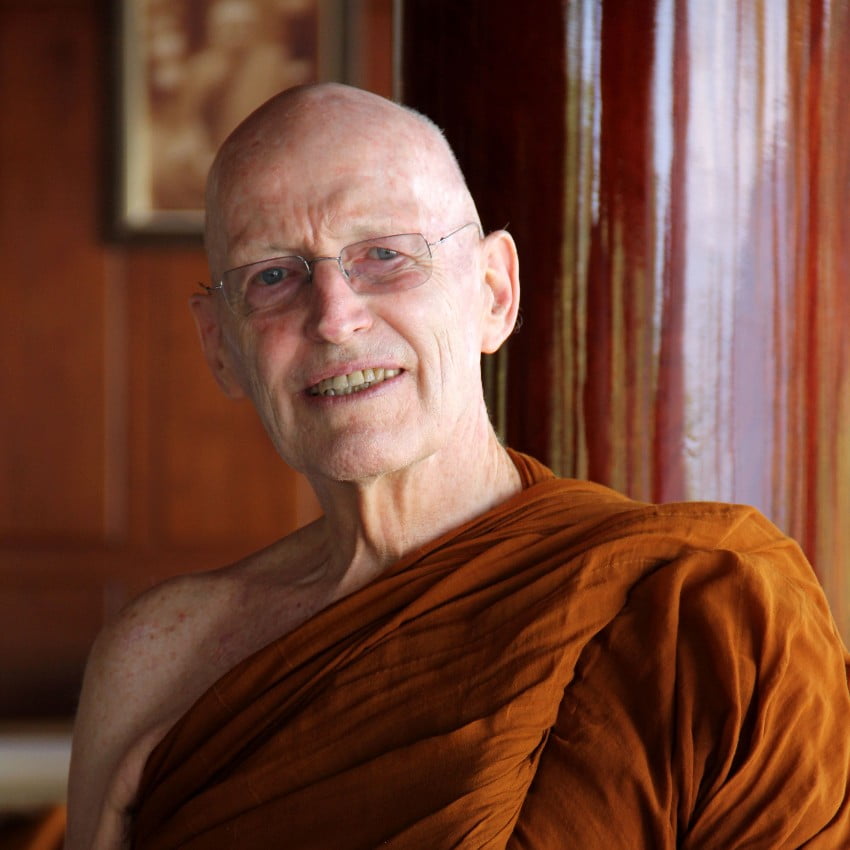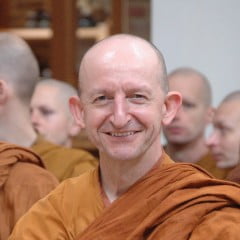In this winter’s retreat, the month of January has passed and a new month begins in the silence, the cold weather, the stillness of winter. Whether the retreat is organized for us to be meditating as a group or alone, being the listener, the witness to the way it is, is the important issue. We’re not trying to get or get rid of anything but to just be the neutral observer, the Buddho, the witness to the way things are. This is bhāvanā – the Pali word for meditation and for developing the Eightfold Path. During these days, many of you will experience a lot of suppressed memories or emotions that... जारी रखें
फिल्टर लागू किया गया
केवल Ajahn Sumedho के लेख दिखा रहे हैं।
This is the half-moon Observance Day, and we have the opportunity to reflect on Dhamma, the way it is. For each one of us, the way it is right now is going to be different: with our own moods, memories, thoughts, expectations or whatever. When we try to compare one person with another, we get confused because we’re all different. On the level of saṅkhāras, or conditioned phenomena, everything is different. Nothing can stabilize into a permanent quality or condition; it’s beyond the ability of saṅkhāras, which by their very nature are changing. The Buddha taught, ‘Sabbe saṅkhārā aniccā – जारी रखें
The Practice of Mettā by Luang Por Sumedho There is a great lack of mettā in the world today because we have overdeveloped our critical faculties: we constantly analyze and criticize. We dwell on what is wrong with ourselves, with others, with the society we live in. Mettā, however, means not dwelling in aversion, but being kind and patient even to what is bad, evil, foul or terrible. It’s easy to be kind to nice animals like little kittens and puppies. It’s easy to be kind to people we like, such as sweet little children, especially when they are not ours. It’s easy to be kind to old ladies and men... जारी रखें
Doom, Destruction, Death, Decay This journey is involved with pain, with loss, as well as with pleasure and with gain. This realm isn’t a realm that we create out of our fantasy life; this realm is the way it is — it’s all about birth and death, about coming together and about separating, about arriving and departing, about having good health and losing it, about being young, attractive and so forth and then then losing it. Separation, loss is the experience of a human lifetime. These are messengers. This is not a grim description of life, but it’s pointing to the realities that we have to deal with... जारी रखें
I’ve always regarded Ajahn Buddhadāsa, along with Luang Por Chah, as one of my primary teachers. I could relate to their way of teaching because it was so direct and simple. Ajahn Chah wasn’t intellectual at all – he hardly ever wrote anything – he always emphasized paṭipadā, practice. He said, “In Thailand monks read too much. They learn Pāli and Abhidhamma, but they don’t ever practice.” So he was trying to fill in a gap there by emphasizing paṭipadā. In the 1960s Tan Buddhadāsa was very controversial in Thailand. He wrote a book called Tua Goo Khong Goo, which translated into... जारी रखें
Well, I think you’re doing it at this center. It is a special place. Thai people are open, they want to know. I’ve seen significant change in the many years I’ve been connected to Thailand, especially in the middle class. People aren’t content with just old traditional Buddhism. There is this very pure tradition, it’s very strong in Thailand. Buddhism does tend to get bogged down in ceremonies and traditional forms – not to put that down, because that kind of preserves the religion itself – but now is a time when Thai people, I think, are ready to develop more on the paṭipadā level, practice... जारी रखें

